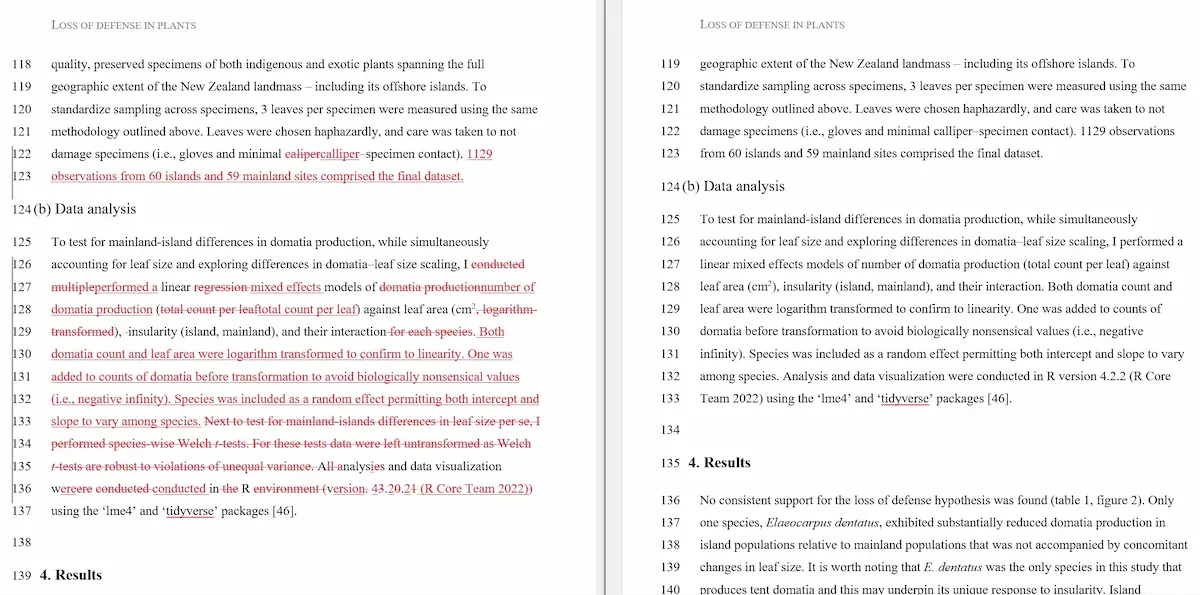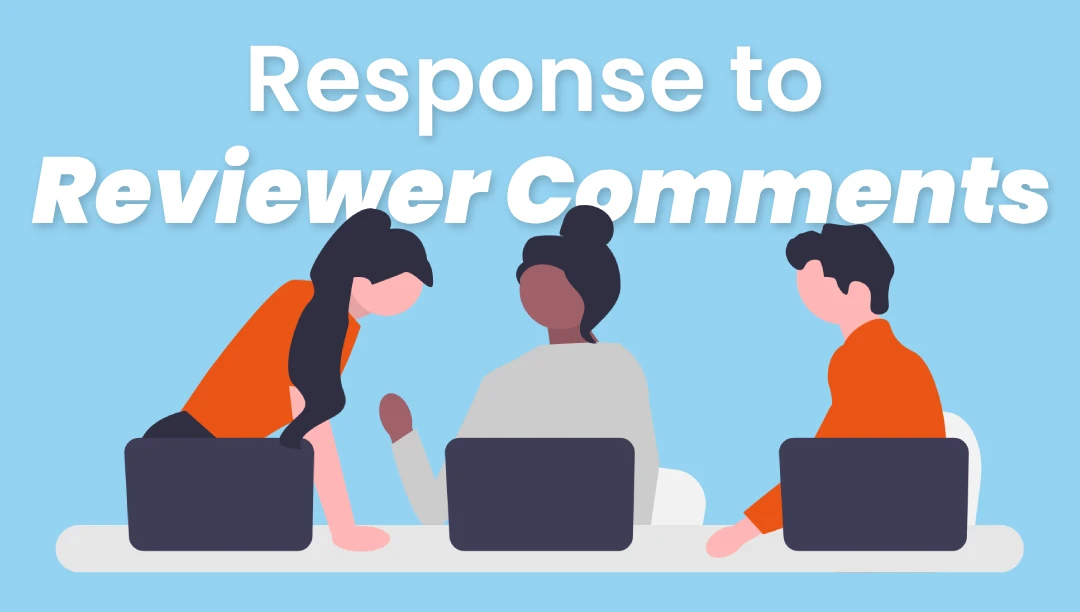Blog • Posted on Dec 2, 2024
Publishing Research: How to Write a Response to Reviewer Comments
Reviewer comments landed in your inbox? You’re not alone in feeling a mix of anxiety and frustration.
But here’s the secret: how you respond can be the difference between your research paper being accepted or rejected.
In this guide, we’ll break down how to respond to reviewer comments with confidence and professionalism. You’ll learn how to address feedback effectively and get that long-awaited “Manuscript Accepted” email.
By the end, you’ll have a clear roadmap for navigating even the toughest reviewer critiques, complete with templates and examples.
Key Takeaways
- Responding to reviewer comments is your opportunity to strengthen your manuscript
- Always respond calmly, respectfully, and comprehensively, even if the feedback feels harsh or inaccurate
- Use a structured approach: thank reviewers, address every comment, and justify your changes (or decisions not to make changes) clearly
- A well-written response letter can significantly influence the editor's decision
Table of Contents
What Are Reviewer Comments and How Do They Help?
Reviewer comments are the feedback you receive after submitting your manuscript to a journal. These comments are designed to:
- Highlight weaknesses in your study or writing
- Suggest improvements to align your work with the journal's standards and scope
- Ensure your manuscript contributes meaningfully to the field
While they might feel intimidating, reviewer comments are an invaluable tool for refining your work.
Did you know only 20% of submissions make it to review? If you've got reviewer comments, you're already in the winning minority - so count your blessings!
Instead of seeing them as criticism, see them as an opportunity for growth.
Growth of your manuscript, and more importantly, of yourself and your skills as an author.
A dedicated mentor can also really help provide perspective and insight when considering reviewer comments.

See How We Can Help You Publish High Impact Easier Than Ever
- Mentoring - real meetings. Real results.
- Professional Editing - our team of former journal editors will get your manuscript publication-ready.
- Online Courses - learn invaluable presenting & writing skills.
Types of Reviewer Comments
Not all feedback is created equal.
Here are the common categories of reviewer comments:
-
Major Revisions
- Address fundamental issues with your methodology, analysis, or interpretations
-
Example:
"The statistical approach used is not appropriate for this dataset. Consider using a mixed-effects model"
-
Minor Revisions
- Focus on clarity, formatting, or minor technical details.
-
Example:
"Please clarify how you selected your study sample in Section 2.3"
-
Positive Comments
- Praise for specific aspects of your work.
-
Example:
"The introduction provides an excellent overview of the knowledge gap"
-
Unclear or Confusing Comments
- Vague feedback that requires interpretation (consider reaching out to the editor for guidance with these)
Steps for Responding to Reviewers
Oddly, researchers don’t receive any formal training in addressing reviewer concerns
That’s quite concerning when you consider how important publishing is to a researchers’ career!
In any case, here’s a step-by-step guide to make sure you don’t screw it up:
1. Read and Process the Feedback
- Take time: Let the comments sink in before reacting. You’ve put a lot of time and effort into this research. It’s best you take a full 24 hours to let your initial emotional response pass before taking an objective look at things.
- Separate emotions: Avoid taking criticism personally. Try not to attach your worth to your work. Paper writing is a lifelong learning process and you can always be better. Consider their points of view objectively and look for opportunities to improve your writing.
- Group comments: Organize feedback into themes (e.g., methods, writing clarity, results). A useful strategy some authors use is to turn these into separate lists and work through each list one at a time.
2. Plan Your Response Strategically
- Prioritize changes: Focus on major revisions first, then minor ones. Sometimes major changes render the minor mistakes irrelevant.
- Collaborate: Discuss feedback with co-authors or colleagues for clarity. Remember your co-authors have to see and sign-off on your responses, even if you are the lead author.
- Decide when to push back: If you disagree with a comment, be prepared to explain why respectfully. Pick your battles here - sometimes it’s simply not worth it.
3. Write Your Response Letter
Writing a great response letter is undoubtedly the best thing you can do to maximize your chances of the reviewers and editors viewing your work in a positive light.
Structure your response to reviewers like this:
Opening paragraph: Thank the editor and reviewers for their feedback.
Editing and reviewing take time. And that time typically isn’t paid for. Acknowledge that.
"We thank the reviewers for their thoughtful comments and suggestions, which have greatly improved the manuscript."
Point-by-point response: Address each comment individually, referencing the reviewer's original wording.
Copy & paste each reviewer comment with line breaks between. Fill the line breaks with your response in italics to help the editor see your response.
Example reviewer comment:
"The discussion section lacks depth on the implications of the findings."
Example response:
"We appreciate this comment. We have expanded the discussion on the implications of our findings (Page 12, Lines 10-18). Specifically, we now discuss the relevance of our results to [specific application]."
Highlight changes: Point to specific page and line numbers for revisions.
Create two versions of your manuscript: one with track-changes enabled and another that is clean with the changes incorporated (what will be re-submitted).

Closing paragraph: Thank the reviewers for the comments and describe how they have helped improve your manuscript.
State your confidence in the revised version.
In particular, highlight how you believe it has improved and now better fits the standards, scope, and expectations of the journal you are submitting to.
For example, the Journal of Applied Ecology requires submitted papers to have implications for the management of the natural environment. If you failed to highlight that in your original submission, this is your chance to rectify that.
"We thank you and the reviewers for your time and valuable feedback on our manuscript. Your comments have greatly enhanced our work, and we appreciate the opportunity to revise and strengthen the manuscript accordingly. We are confident that the changes we have made address all the concerns raised, and we hope the revised version meets your expectations."
Tips for Handling Harsh or Unfair Reviewer Comments
We’ve all been there. You’ve waited months for your manuscript to come back from review and it’s riddled with unprofessional, emotionally-filled comments.
Here’s how to stay calm and win:
- Stay professional: Avoid defensive or emotional language. Anger or frustration in your response are a surefire way to get your manuscript rejected.
- Seek clarification: If a comment is unclear, you can request clarification from the editor. Before you do, also check with your colleagues whether they can distill what the reviewer meant.
- Know when to push back: If you disagree with a suggestion, explain your reasoning calmly and back it up with evidence.
Common Mistakes to Avoid
- Ignoring comments: Always address every comment, even if only to explain why a change wasn’t made.
- Being vague: Provide clear and specific responses.
- Overlooking details: Ensure your revised manuscript aligns with your response letter.
FAQs
What if I disagree with a reviewer’s suggestion?
You don’t have to agree with everything the reviewer says. But you should at least consider their points. If you’re not going to comply with the reviewer’s comment, disagree respectfully in your response to the reviewers document and provide clear, supporting rationale for your decision.
How long should my response letter be?
As long as necessary to address all comments. Most responses range from 2-5 pages.
Can I ask for more time to revise my paper?
Yes, but communicate with the editor as early as possible and elaborate on why you need more time. For example, you might have received a lengthy review and making all of the suggested changes is taking longer than expected. Or you may simply be trying to balance manuscript edits with other professional responsibilities.
Conclusion
Responding to reviewer comments is a skill that can make or break your chances of publication. With a clear strategy, respectful tone, and thorough responses, you can turn even harsh critiques into an opportunity for growth.
Still unsure how to handle your reviewer comments? RURU offers expert editing and revision support to help you tackle the toughest feedback.
Let's get your work published. Book a 1:1 clarity call today!
Dr. Matt Biddick is a Senior Editor & Research Consultant at RURU. You can book sessions with him here.

